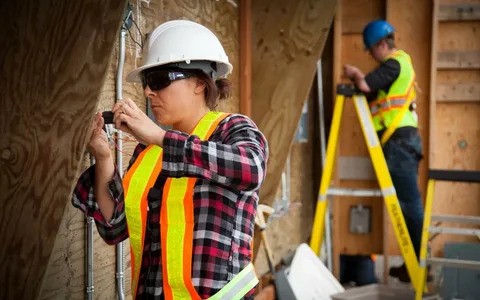Ireland Construction Jobs
Before diving into the details, here’s a quick overview of what you’ll learn: Ireland’s construction sector employed 161,300 people at the end of 2023 and is forecast to grow from €11.10 billion in 2024 to €11.83 billion in 2025, with a compound annual growth rate (CAGR) of 6.6 % expected through 2025–2029 FIEC Statistical ReportBusiness Wire. You’ll explore current employment trends, in-demand roles (from laborer to project manager), real 2024–2025 salary benchmarks (e.g., laborers at €13.87/hr up to project managers at ~€62 970/yr PayscalePayscale), training and certification pathways, visa and work-permit options, and actionable tips to land your perfect role in Ireland’s booming construction landscape.
Ireland’s Construction Sector at a Glance
The Irish construction industry is on a sustained upswing, underpinning the nation’s economic recovery and infrastructure expansion. Direct construction employment reached 161 300 people by the end of 2023, marking an all-time high despite labour and skills shortages FIEC Statistical Report. In Q4 2024, overall employment in Ireland rose by 70 000 (2.6 %) to 2.78 million, reflecting broad-based growth outside of Dublin (+48 000 jobs) and full-time employment gains (+82 900) Enterprise Ireland. The Construction Industry Federation’s Q4 Outlook Survey reports that 43 % of construction firms expect labour costs to continue rising, underscoring fierce competition for skilled workers Construction Industry Federation.
Market Size & Growth Projections
Ireland’s construction market was valued at €11.10 billion in 2024 and is projected to expand by 6.6 % annually to reach €11.83 billion in 2025 Business Wire. Over the 2025–2029 period, the sector is forecast to grow at a 5.2 % CAGR, nearing €15.38 billion by 2029 Business Wire. This upswing is driven by residential housing projects, commercial developments, and significant public infrastructure investment, particularly in transport and energy.
Employment Trends & Future Outlook
Year-on-year surveys highlight robust employment growth across all company sizes and sub-sectors. In Q2 2024, 30 % of firms reported a year-on-year increase in workforce, with 26 % planning further hiring in Q3 2024 Construction Industry Federation. Civil engineering and specialist contracting are the outliers, facing modest order-book dips even as general contracting and home building surge. Nationwide, the ILO-defined employment rate for ages 15–64 climbed to 74.4 % in Q2 2024, the highest since 1998 Central Statistics Office.
Skills Shortages & Upskilling
Despite high employment, a skills gap persists: firms report shortages in bricklayers, carpenters, plumbers, and electricians . The government is responding with expanded apprenticeships and targeted training initiatives, allocating €67 million to boost enrolment in trades programs and launch digital marketing campaigns to attract workers home .
In-Demand Construction Roles & Salary Benchmarks
Below are key positions in Ireland’s construction sector, along with 2024–2025 salary data:
| Role | Pay Basis | Entry Range | Experienced Range | Source |
|---|---|---|---|---|
| Construction Laborer | Hourly | €10.00 – €19.00/hr | Avg. €13.87/hr | PayScale (Mar 2025) Payscale |
| Construction Foreman | Hourly | €19.00 – €35.48/hr | Avg. €23.95/hr | PayScale (Mar 2025) Payscale |
| Carpenter / Builder | Hourly | €10.93 – €21.53/hr | Avg. €15.14/hr | PayScale (Nov 2024) Payscale |
| Electrician | Annual | — | Avg. €53 138/yr | Indeed (May 2025) Indeed |
| Master Plumber | Annual | — | Avg. €52 000/yr | PayScale (2025) Payscale |
| Project Manager, Construction | Annual | — | Avg. €62 970/yr | PayScale (2025) Payscale |
| Construction Manager | Annual | €34 000/yr | €59 000 – €78 000/yr | PayScale (Apr 2025) Payscale |
| Estimator (Quantity Surveyor) | Annual | €33 000 – €45 000/yr | Avg. €38 333/yr | PayScale (Feb 2024) Payscale |
Entry-Level vs. Senior Roles
Entry-level positions (laborer, trainee carpenter) typically command €25 000–€35 000 annually, while skilled tradespeople (electricians, plumbers) earn €50 000–€55 000 per year once fully qualified IndeedPayscale. Supervisory and management roles (foreman, project manager) can exceed €60 000 annually, with bonuses and profit-sharing on top.
Pathways to Entering Construction
Apprenticeships & T-level Equivalents
Apprenticeships remain the gold standard for trades training. SOLAS-approved schemes offer paid, on-the-job learning combined with off-site block release at Institutes of Technology, culminating in QQI-recognised qualifications. For example, an electrician apprenticeship spans 4 years, with hourly pay rising from €23.49 as a newly qualified spark to €25.60 in later years Connect Union.
Third-Level Courses & Certifications
Quantity Surveying and Construction Management diplomas/degrees from UL, TU Dublin, and CIT feed graduates directly into junior estimator and site-manager roles. Short courses in health & safety (PSCS card, IPAF, FETAC Level 5) boost employability.
Upskilling & CPD
Continuous Professional Development (CPD) is critical as modern methods of construction (MMC) and off-site manufacturing (OSM) gain traction. Certifications in BIM, drone surveying, and green-building practices can command salary premiums and broaden career pathways into specialist contracting FIEC Statistical Report.
Visa & Work-Permit Options
EU/EEA Citizens
Enjoy free movement—no work permit needed. Registration with JobsPlus within three months of arrival grants a formal Certificate of Registration.
Non-EU Nationals: Critical Skills Employment Permit
This permit fast-tracks highly skilled roles (project managers, engineers) with a minimum salary threshold of €32 000 per year and exemptions from labour-market impact assessments Enterprise Ireland.
General Employment Permit
For trades and mid-level roles (electricians, carpenters) with annual salaries from €30 000 to €60 000, subject to employer applying and demonstrating no suitable EU/EEA candidate.
How to Secure Your Construction Job in Ireland
1. Tailor Your CV & Portfolio
-
Highlight hands-on experience: list completed projects, apprenticeship milestones, and any site responsibilities.
-
Include certifications: PSCS, CSCS, Safe Pass, first aid.
-
Use action verbs: “installed,” “surveyed,” “coordinated.”
2. Targeted Job Portals
-
Indeed.ie and IrishJobs.ie: broad construction listings.
-
ConstructionJobs.ie: specialist portal for all trades and management roles.
-
LinkedIn: essential for white-collar roles (project manager, estimator).
-
JobsPlus.ie: public employment service with apprenticeship listings.
3. Networking & Trade Associations
Joining the Construction Industry Federation (CIF) or local trade bodies (e.g., Electric Ireland Skillnet, Carpenter & Joiner Network) offers access to exclusive job boards and networking events.
4. Preparing for Interviews
-
Research your prospective employer and recent projects.
-
Demonstrate safety awareness by discussing toolbox talk experiences.
-
Be ready to showcase physical readiness and tool-handling proficiency.
Benefits & Challenges of Construction Work
Benefits
-
Competitive Pay: Even entry-level wages in construction outpace many sectors, with overtime premium and shift allowances.
-
Job Security: Ongoing housing and infrastructure projects ensure steady demand.
-
Career Progression: Clear pathway from apprentice to site manager or contractor.
-
Satisfaction: Tangible outcomes—seeing buildings rise daily.
Challenges
-
Physical Demands: Long hours, heavy lifting, exposure to weather conditions.
-
Safety Risks: Requires strict adherence to PPE and safety protocols.
-
Cyclical Demand: While robust now, economic downturns can slow project starts.
-
Skills Shortages: Competition for qualified tradespeople drives labour costs up.
FAQs
Q: Do I need Irish qualifications to work here?
A: No—UK and EU qualifications are recognised; non-EU credentials may require Irish equivalence assessments via Qualifax.
Q: What is a Typical Day for a Construction Laborer?
A: Tasks include site preparation, material delivery checks, basic masonry or carpentry follow-up, and end-of-day clean-up, earning around €13.87/hr Payscale.
Q: Can I switch from trade to management?
A: Yes—many begin as apprentices and, after journeyman status, pursue diplomas in construction management, leading to roles with average wages near €58 973/yr Payscale.
Q: How quickly can I get a Critical Skills Permit?
A: Processing typically takes 6–8 weeks, with priority handling for ICT and engineering roles.
Ireland Construction Jobs
Ireland’s construction sector offers abundant opportunities across skill levels, from apprentices earning €6–€15/hr to project managers commanding €63 k+/yr PayscalePayscale. With sustained market growth, strong public and private investment, and expanding apprenticeship programs, now is an ideal time to build your career on the Emerald Isle. Update your CV, secure relevant certifications, and explore ConstructionJobs.ie, Indeed.ie, and JobsPlus.ie today—your future in construction awaits!



